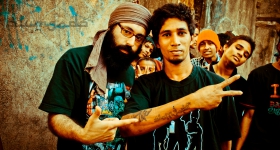Photographer Matt Reamer
Mike Shinoda is in one of the world’s biggest bands, Linkin Park, which has sold 36 million records. Shinoda has a lot of cheddar, but instead of installing
princess-cut fronts on his teeth, he formed a side project, Fort Minor, which allows him to explore more deeply his hip-hop and electronic influences and address topics outside the Linkin Park realm. The album The Rising Tied was executive produced by Jay-Z and released in late 2005.
One Fort Minor song called “Kenji” is about the Japanese American internment during World War II. Shinoda’s father’s family was interned in Manzanar. “Kenji” is based on interviews with his father and aunt. Shinoda raps about how the family was given two days to pack everything into two bags, the depression, racial profiling, living under lockdown and growing crops for the guards. The voices of his father and aunt can be heard in sound bites.
In 2006, Shinoda accepted a Grammy award with Jay-Z for Best Rap/Sung
Collaboration. Shinoda also received another prestigious award the week prior at the Japanese American National Museum’s Annual Gala for outstanding contribution. His position as a successful
musician allows him to spread awareness of issues like the internment and
the tsunami that struck Southeast Asia in 2004 (Linkin Park co-founded Music For Relief after the tsunami devastated areas they had just played on tour) to an audience that wouldn’t normally be up on those things.
Hyphen spoke with Shinoda, who was on tour with Fort Minor. He talks about growing up hapa, the benefits of being in a successful band and how he got his aunt to open up about the internment experience.
Growing up, how much did you identify with your Japanese American heritage?
MIKE SHINODA: With a lot of people like me who are half and look more Caucasian than Asian, we’re chameleons. We can blend. Our experience is more subliminal. People don’t immediately associate you with a race. They see you as mixed. I would hear people make racist comments about Asians but they had no clue I was Japanese. Stuff like that happened. It never occurred to me how Japanese American my upbringing was. I’m not saying it was strong or weak, but eventually I started to see things were different from other people. I realized my New Year’s Day, and just the way we do things around the house, certain facets of our lifestyle, were a little different from others. Friends would come over and we’d be having steak. There’d be steak, broccoli and steamed rice, and friends go, “You’re having Chinese rice with steak?” I’d go, “It’s not Chinese rice, but yeah, we are.” Little things like that.
Did you play in the basketball leagues or dance in Obon?
I didn’t do the basketball leagues. I went to Obons a couple times. Our thing was New Year’s. You go down to Little Tokyo with the family and there’s all kinds of events and food.
How was internment covered in school?
It pretty much wasn’t. They had half a page in the high school history book. At the top of the page was a picture of the bombing of Pearl Harbor. So it was like: “We put these people in prison camps, look at what they did to us.” That was the attitude. I remember seeing that and being pissed off about it. You’re young and have all the different chemical imbalances going on. It makes you very angry. I did a paper about it.
How did you learn about your own family’s
experience?
Before I even read about it in a history book, my dad told me about it. I remember my family alluding to it at different points. A lot of families who were interned stuck together because it was such a surreal thing that happened. They formed a bond because nobody else had their back. We’d be at some place, and run into the family they knew from camp. And they’d say, ‘Hi,’ catch up and then go on their way.
And the funny thing is, they would never bring up the internment. It’s always about what they did in Vegas or their golf game.
Yeah! Vegas, especially! It killed me
because I knew where they’d met. It’s the whole shikata ga nai thing—“it can’t be helped.” I think it was an appropriate way to deal with things in the ’40s and ’50s. It’s a very respectable attitude to look forward to the future. But now, in today’s times,
I think we would benefit from getting
the information.
How difficult was it to get your dad and aunt
to open up?
I knew my dad would do the interview. They are two of 13 brothers and sisters. Nine are left. They are two different experiences that sum up the internment. My dad was 3 to 4 years old and my aunt was in her 20s. She’s in her 80s now; she has experience talking about it. I had to plan my questions very carefully. I obviously wanted to get information she was comfortable telling. It took a couple of hours. She ran out of standard answers after an hour. You have an hour of responses in the safe zone, then they reveal what really happened. She told me about the way they set up the partitions in the room. They used thumbtacks and bed sheets. They had 20 to 30 people in one barrack. I don’t believe there was a toilet; they had to go to center of camp. I’m going to release an interview-only version of the song. There’s no drum loop and no rap vocals. I’m going to put it up on FortMinor.com.
Was Jay-Z up on the internment?
I didn’t talk to him about it. With Jay, he’s such a busy guy to focus on one thing at a time. He’s an entertainer! The only conversations we had about it was there was a scenario where two songs had to be on the record: “Kenji” and “Where’d You Go,” which is about my wife. Jay-Z basically decided what songs would go on the record and he was like, “Yeah OK.”
What’s been the reaction to “Kenji” thus far?
I ran that song by my whole family. My dad’s side is 150 strong. I played the song for as many people I could get together with. We had a family reunion with 75
to 100 and I played it for them in little groups of 10.
Why such small groups?
I wanted to make sure they were OK with it. I told them if anybody is concerned to give me input. My uncle, who is a very stoic Japanese guy, cried when he heard the song. He couldn’t help it. He said he loved it. That’s when I started thinking I had to put this on the album or else I’ll end up kicking myself for life.
Your high profile is extremely important. What kind of effect have you seen Linkin Park have on issues?
One thing people focus on a lot is the charity organizations we are affiliated with. We started Music for Relief. We started that after the tsunamis hit. We were on tour in Southeast Asia the same year. Watching TV, we saw places we had just played completely devastated. It broke our hearts, and we had to do something. We formed the organizations because we can connect people with music in ways traditional organizations cannot. It’s more difficult for Red Cross to put on a concert with Jay-Z, Linkin Park and No Doubt. For us, that’s easy. We are personally very proud. At the last tour, we took an equal amount of proceeds from six nights and each member got to donate them to whatever charity they wanted. I gave mine to Densho (a Japanese American legacy project), the Japanese American National Museum and LA AIDS Project.
A number that sticks out for me is 36 million records sold. How does the success magnify what responsibilities you have to your audience?
The responsibility in having the voice to speak to people around the world is you have to be considerate. We don’t get into politics and those types of conversations, because we know our younger fans are learning about those things. We wouldn’t want to lead them in a direction without them learning things for themselves. If you want to learn about something, you should do it on your own.
What keeps you up at night?
At this point of my life, it’s music related. We’re working on a Linkin Park record and Fort Minor is taking off. The things I get worried about are straight personal, things that people worry about like relationships. People always go, ‘Life is good. You should be happy,’ but the exact same things that keep them up at night are what keeps me up at night.
Todd Inoue last wrote about “Bizarre Love Triangle” for Hyphen. Matt Reamer is an Oakland, CA-based documentary photographer. See his work at halffullphoto.com.









Comments